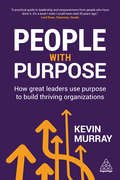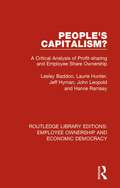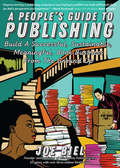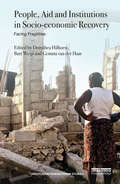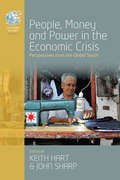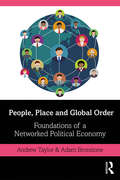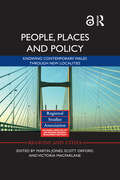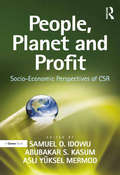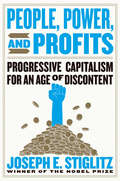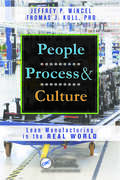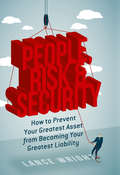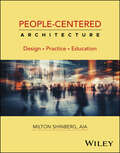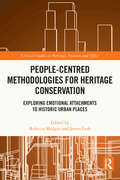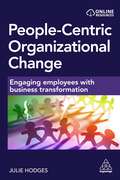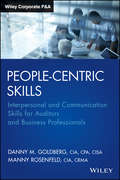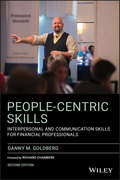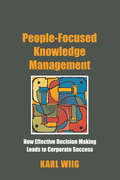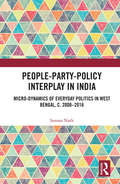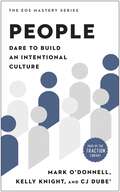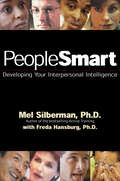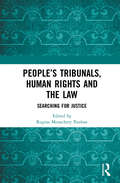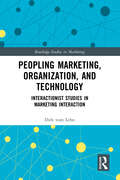- Table View
- List View
People vs. Profits: Columns of Victor Perlo
by Victor Perlo Ellen Perlo Stanley Perlo Arthur PerloThe Home Front 1961-1999. Selections from columns written for the People's Weekly World on wages, jobs, taxes, health care, social security, profits and more. A valuable handbook for working families and social activists.
People with Purpose: How Great Leaders Use Purpose to Build Thriving Organizations
by Kevin MurrayThis book is about how great leaders can make purpose the beating heart of their organization and use it to power performance. Leaders who communicate a defined mission, alongside clear and genuine values, allow their employees to feel a sense of purpose in their roles and embody their company's vision. This inspires engagement, loyalty and higher performance. People with Purpose brings together a wide range of compelling research into how having a clearly defined purpose as part of business strategy is a vital element in business success, longevity and inspired teams. People with Purpose shows leaders how to create a valuable framework that integrates purpose, values and goals on a single page in order to articulate their organization's unique vision to employees and stakeholders. Kevin Murray interviews top CEOs who have used purpose to transform performance, motivate their people, develop organizational resilience and deliver results - often from the very edge of disaster. These leaders share how they have articulated their purpose, their values and their goals. People with Purpose also looks at the work of neuroscientists, brings together the evidence from around the world that proves purpose powers performance, and shows why purpose matters more in a digitally connected and transparent world. More than 30 case studies are explored from exclusive interviews with leaders from a range of organizations, including Odeon and UCI Cinemas, Healthcare at Home, Yodel, Monarch Airlines, Moss Bros and Virgin Atlantic.
People's Capitalism?: A Critical Analysis of Profit-Sharing and Employee Share Ownership (Routledge Library Editions: Employee Ownership and Economic Democracy #1)
by Jeff Hyman Harvie Ramsay Lesley Baddon Laurie Hunter John LeopoldFirst published in 1989. In the decade before this book was originally published, employee share ownership and profit sharing had increased markedly as successive governments introduced fiscal legislation promoting their uses. Yet how successful had ‘people’s capitalism’ been? The Glasgow study was a major empirical investigation into this issue and was a response to the need for an independent assessment. It discusses how attitudes to ownership had changed and how these, in turn, related to attitudes to work. It also addresses the implications of profit sharing and employee share ownership for industrial relations both for individual companies and at a national level.
People's Guide to Publishing: Building a Successful, Sustainable, Meaningful Book Business From the Ground Up
by Joe BielSo, you want to publish books.Drawing on 23 years of experience operating an independent publishing company, Joe Biel has written the most accessible and comprehensive guide to running a successful publishing business. You'll learn all the skills of the trade, including how to:Develop your individual books to connect with readers on a practical and emotional levelChoose between offset printed, digitally printed, and eBook formats and work effectively with printersBuild an authentic niche so you can reach your audience and sell books directlyUnderstand if and when you're ready to work with a distributor or large online retailerCreate a budget and predict the cost and income of each book so your company stays in the blackDecide what work you need to do yourself and what can be done by othersPlan for sustainable growthFeaturing interviews with other upstart independent publishers and funny anecdotes from publishing's long history as well as detailed charts and visuals, this book is intended both beginners looking for a realistic overview of the publishing or self-publishing process and for experienced publishers seeking a deeper understanding of accounting principles, ways to bring their books to new audiences, and how to advance their mission in a changing industry. All readers will come away with the confidence to move forward wisely and a strong sense of why publishing matters today more than ever.
People, Aid and Institutions in Socio-economic Recovery: Facing Fragilities (Routledge Humanitarian Studies)
by Bart Weijs Dorothea Hilhorst Gemma Van Der HaarAn estimated 2 billion people live in countries affected by fragility, conflict and violence. Extreme poverty is increasingly concentrated in these areas, and governments and international agencies seek avenues to enable socio-economic recovery and to support people as they try to rebuild their lives and livelihoods. People, Aid and Institutions in Socio-economic Recovery: Facing Fragilities provides an in-depth understanding of people’s strategies in the face of conflict and disaster-related fragility and examines how policies and aid interventions enable their socio-economic recovery – or fail to do so. Through field-based research, the book captures the complex and unfolding realities on the ground, exploring the interfaces between economic, social and institutional change. This provides a rich and unique vantage point from which to reflect on the impact of recovery policies. The book provides a set of cross-cutting findings that aim to inform policy and practice. The detailed case studies of the book lay bare key dynamics of recovery. Set against the findings from two chapters that review the literature, the cases provide evidence-based lessons for socio-economic recovery. The chapters combine qualitative and quantitative methodologies and form a valuable resource to researchers and postgraduate students of disaster management, conflict, humanitarian aid and social reconstruction, and development management.
People, Money and Power in the Economic Crisis: Perspectives from the Global South
by John Sharp Keith HartThe Cold War was fought between "state socialism" and "the free market." That fluctuating relationship between public power and private money continues today, unfolding in new and unforeseen ways during the economic crisis. Nine case studies -- from Southern Africa, South Asia, Brazil, and Atlantic Africa - examine economic life from the perspective of ordinary people in places that are normally marginal to global discourse, covering a range of class positions from the bottom to the top of society. The authors of these case studies examine people's concrete economic activities and aspirations. By looking at how people insert themselves into the actual, unequal economy, they seek to reflect human unity and diversity more fully than the narrow vision of conventional economics.
People, Place and Global Order: Foundations of a Networked Political Economy
by Andrew Taylor Adam BronstoneGlobalization and technology are combining to change socio-economic relationships. The pace of change and uncertainty of the world of work – no job for life, zero-hours contracts, diminished pension rights and a growing delivery dependence on digital networks over human contact – are creating a profound unease that may be unprecedented in the Western world. If organizational patterns are not sufficiently adjusted and businesses continue as usual, we run the risk of alienating entire groups within society with many feeling ‘left behind’. Using deliberately accessible language for students and the general reader, the authors draw upon socially innovative models of economic organization from the nineteenth century to present a model to master this new economy for the common good. The book illustrates, with practical examples, how digital networks can be leveraged and provides a common checklist to identify suitable conditions for organizations to flourish and provide the means to more effectively evaluate opportunities.
People, Places and Policy: Knowing contemporary Wales through new localities (Regions and Cities)
by Martin Jones Scott Orford Victoria MacfarlaneThe Open Access version of this book, available at www.tandfebooks.com, has been made available under a Creative Commons Attribution-Non Commercial-No Derivatives 3.0 license. Set within the context of UK devolution and constitutional change, People, Places and Policy offers important and interesting insights into ‘place-making’ and ‘locality-making’ in contemporary Wales. Combining policy research with policy-maker and stakeholder interviews at various spatial scales (local, regional, national), it examines the historical processes and working practices that have produced the complex political geography of Wales. This book looks at the economic, social and political geographies of Wales, which in the context of devolution and public service governance are hotly debated. It offers a novel ‘new localities’ theoretical framework for capturing the dynamics of locality-making, to go beyond the obsession with boundaries and coterminous geographies expressed by policy-makers and politicians. Three localities – Heads of the Valleys (north of Cardiff), central and west coast regions (Ceredigion, Pembrokeshire and the former district of Montgomeryshire in Powys) and the A55 corridor (from Wrexham to Holyhead) – are discussed in detail to illustrate this and also reveal the geographical tensions of devolution in contemporary Wales. This book is an original statement on the making of contemporary Wales from the Wales Institute of Social and Economic Research, Data and Methods (WISERD) researchers. It deploys a novel ‘new localities’ theoretical framework and innovative mapping techniques to represent spatial patterns in data. This allows the timely uncovering of both unbounded and fuzzy relational policy geographies, and the more bounded administrative concerns, which come together to produce and reproduce over time Wales’ regional geography.
People, Planet and Profit: Socio-Economic Perspectives of CSR
by Samuel O. Idowu Abubakar S. KasumIt is no longer the case that it’s only society which benefits from CSR actions. A corporation actually helps itself when operating sustainably and does well because of its triple bottom line actions. The editors of People, Planet and Profit believe that whilst Corporate Social Responsibility is by now a familiar concept to academics or practitioners, insufficient attention has been paid to the end product of CSR in practice, which they define in terms of social and economic developmental effect. The contributions in this edited volume explain the developmental aspect of CSR from a conceptual perspective and provide empirical evidence of the impact of CSR delivery on stakeholders in different corners of the World. The emphasis is on what corporations take from and give back to their stakeholders whilst trying to behave in a corporately responsible fashion. Stakeholders, including employees, customers, host communities, governments and NGOs have diverse interests and expectations of CSR. This gives rise to questions about whether the activities corporations support are the ones today’s stakeholders need; whether the CSR programmes being delivered are adequate; and about the relationship between the corporations’ view of what constitutes CSR and that of the supposed beneficiaries. This book offers thoughtful answers to these questions and assesses the outcomes of corporate activities both in developed and developing countries and regions, in terms of economic progress and social and political advancement.
People, Power, and Profits: Progressive Capitalism For An Age Of Discontent
by Joseph E. StiglitzA Nobel prize winner challenges us to throw off the free market fundamentalists and reclaim our economy. We all have the sense that the American economy—and its government—tilts toward big business, but as Joseph E. Stiglitz explains in his new book, People, Power, and Profits, the situation is dire. A few corporations have come to dominate entire sectors of the economy, contributing to skyrocketing inequality and slow growth. This is how the financial industry has managed to write its own regulations, tech companies have accumulated reams of personal data with little oversight, and our government has negotiated trade deals that fail to represent the best interests of workers. Too many have made their wealth through exploitation of others rather than through wealth creation. If something isn’t done, new technologies may make matters worse, increasing inequality and unemployment. Stiglitz identifies the true sources of wealth and of increases in standards of living, based on learning, advances in science and technology, and the rule of law. He shows that the assault on the judiciary, universities, and the media undermines the very institutions that have long been the foundation of America’s economic might and its democracy. Helpless though we may feel today, we are far from powerless. In fact, the economic solutions are often quite clear. We need to exploit the benefits of markets while taming their excesses, making sure that markets work for us—the U.S. citizens—and not the other way around. If enough citizens rally behind the agenda for change outlined in this book, it may not be too late to create a progressive capitalism that will recreate a shared prosperity. Stiglitz shows how a middle-class life can once again be attainable by all. An authoritative account of the predictable dangers of free market fundamentalism and the foundations of progressive capitalism, People, Power, and Profits shows us an America in crisis, but also lights a path through this challenging time.
People, Process, and Culture: Lean Manufacturing in the Real World
by Jeffrey P. Wincel Thomas J. Kull, PhDExamining Lean processes in the context of the authors’ academic research in-progress, People, Process, & Culture: Lean Manufacturing in the Real World illustrates the impact of culture on the implementation of Lean Manufacturing (LM) across various geographic and cultural areas. It identifies cultural values, as examined against Lean manufacturing disciplines, and derives culturally based Lean Manufacturing (LM) values. It then assesses these cultural values in light of specific LM components, such as PULL systems and TPM, to demonstrate varying perspectives and applications. Illustrates global cultural influences on Lean implementation Uses academic research as the foundation of the material Examines the many Lean components currently in use around the world Building on the continued prominence of LM as the preferred operational approach, the book supplies time-tested advice to help you sort through the flood of information on Lean techniques and culture. It examines the numerous Lean components currently being deployed successfully around the world and identifies the limitations that can result from the varying interpretations and applications of Lean systems.Lean culture is all about Lean vision, mission, and values. This book not only identifies the Lean values required, but also supplies the understanding to integrate these values across all levels of your organization. The book will be especially helpful to international corporate managers working to demystify the sometimes hard-to-understand characteristics of Lean transformation.
People, Risk, and Security
by Lance WrightLance Wright shows why business in the 21st century requires a new understanding of the intersection of risk, security, and human resource management. He argues that these areas should no longer be considered separate processes, handled by technical specialists with limited spheres of expertise. People, risk and security management should be treated as a critically important integrated business management system. People may be your greatest asset - but they can also be your biggest liability. They expose you to all sorts of risks - risks from things they can do (or fail to do) and from things that can be done to them. No matter how tight a risk and security management policy may be in theory, it can fail on its first contact with reality if it doesn't understand the people involved. Wright understands people, risk and security like few others. For years he was in charge people management for leading oil companies - getting people into and out of some of the most dangerous and hostile work environments on the planet - and keeping them safe while they were there. Then he was responsible for a private army, literally licenced to kill, guarding nuclear submarines that were being decommissioned as part of the Megatons to Megawatts program. Risk is more than a set of formulas. Security is more than guns, gates, and badges. Both ultimately come down to the people you are responsible for. One day, the depth of your understanding of that connection may what stands between you and disaster.
People-Centered Architecture: Design, Practice, Education
by Milton ShinbergShinberg has done something truly impressive: He has created a practical framework for architectural thinking and design, grounded in the latest research on human perception and cognition. His ideas and insights offer a fresh perspective that have helped me clarify many aspects of my own approach to design. —Stefan Behling, Architect, Senior Executive Partner, Head of Studio, Foster+Partners, London This book is a must-read for architects and designers at any stage of their career. His inspiring and practical narrative makes even the most complex concepts accessible. Along the way, he offers aspiring and experienced professionals a fresh perspective to reignite their passion for architecture. —Andrea de Paiva, Architect, Urban Planner, and Author, Director of NeuroAU at the University of Brasilia Milton Shinberg is at the vanguard of architects convinced that the design of buildings for people to flourish should incorporate a deep understanding of human psychology and neuroscience. A very clearly written book, rich with reflections from the science of human emotions, embodiment, and aesthetics, People-Centered Architecture will greatly enhance architectural thinking, education, and practice. —Anjan Chatterjee, MD, FAAN, Professor of Neurology, Psychology, and Architecture, University of Pennsylvania A veteran architect’s pragmatic guide to re-energizing design thinking, architectural practice and architectural education, with pivotal insights from the human sciences and wisdom harvested from non-architects. People-Centered Architecture: Design Practice Education is a unique and probing exploration designed to help architects better serve everyone who uses what architects design. In this one-of-a-kind book, architect and educator Milton Shinberg presents game-changing approaches to enhance, reorient, and re-energize design thinking. Shinberg draws from decades of dialogue with architects, designers, clients, artists, scientists, teachers, and his own students. His prompts and provocations, written in a clear and accessible narrative style, are organized to help architects, who are humanists, come to know much more about humans. Wise design becomes easier. In one concise volume, People-Centered Architecture: Design Practice Education delivers a vibrant framework for architectural practice, for students and teachers of architecture, and for clients and stakeholders. Through this book, each will see their project partners more clearly, more empathetically, and in ways that foster richer, better brainstorming and more productive collaboration. The “coalition of the curious,” people intrigued by architecture and architects, will get a peak behind the curtain.
People-Centred Methodologies for Heritage Conservation: Exploring Emotional Attachments to Historic Urban Places (Critical Studies in Heritage, Emotion and Affect)
by Rebecca Madgin James LeshThis book presents methodological approaches that can help explore the ways in which people develop emotional attachments to historic urban places. With a focus on the powerful relations that form between people and places, this book uses people-centred methodologies to examine the ways in which emotional attachments can be accessed, researched, interpreted and documented as part of heritage scholarship and management. It demonstrates how a range of different research methods drawn primarily from disciplines across the arts, humanities and social sciences can be used to better understand the cultural values of heritage places. In so doing, the chapters bring together a series of diverse case studies from both established and early-career scholars in Australia, China, Europe, North America and Central America. These case studies outline methods that have been successfully employed to consider attachments between people and historic places in different contexts. This book advocates a need to shift to a more nuanced understanding of people’s relations to historic places by situating emotional attachments at the core of urban heritage thinking and practice. It offers a practical guide for both academics and industry professionals towards people-centred methodologies for urban heritage conservation.
People-Centric Organizational Change: Engaging Employees with Business Transformation
by Professor Julie HodgesThe only way to achieve successful business change is by engaging employees and making the transformation people-centric. This book explains how to achieve this. Written by a leading voice in the change management industry who has both academic and practitioner experience, People-Centric Organizational Change is a practical guide for change professionals and postgraduate students. It covers everything from what people-centric change is and why it's essential to engage people with the change through to the importance of the communication of change and how to do this effectively with a distributed workforce in a hybrid working environment. Using evidence-based research, this book fully explores the human dynamic of change, explains how to promote collaboration between colleagues and shows how to involve line managers in the change process. There is also advice on how to encourage staff to see change as an opportunity rather than a threat. People-Centric Organizational Change also includes discussion of the impact of change on employee wellbeing as well as the relationship between Equality, Diversity and Inclusion (EDI) and change. There is also advice on how to build people-centric initiatives into an overall change strategy. It is full of country agnostic tools and tips that can be used across cultures as well as frameworks and skills that can be applied in public, private and third sector settings. Global case studies and examples throughout help to put the content into context and show how a people-first approach to change works in practice. Online resources include PowerPoint slides for each chapter.
People-Centric Skills: Interpersonal and Communication Skills for Auditors and Business Professionals (Wiley Corporate F&A)
by Danny M. Goldberg Manny RosenfeldBusiness Professionals, to be Truly Effective and Advance in their Careers, Must Master their People-Centric Skills. People-Centric Skills: Interpersonal and Communication Skills for Auditors and Business Professionals is a comprehensive guide to the "soft skills" that make technical professionals more effective. People-Centric Skills aim to improve all aspects of personal interactions, relationship development, and communication. These skills are as essential to success as are technical capabilities. This is the story of a leading internal audit department taking that next step to becoming a world-class audit organization in a fictional company. The foundation of that next step is developing their People-Centric Skills. The book demonstrates the impact that interpersonal and communication skills – whether good or bad – have on an auditor's effectiveness, job, and career. Readers will be able to empathize with the characters, and relate to the real-life situations in which they find themselves. Each chapter features a summary of key People-Centric points and guidelines that will help readers apply what they've learned to their own projects and departments. In a 2013 study sponsored by the Institute of Internal Auditors ("IIA"), the seven key attribute areas identified to be a successful auditor include relationship building, partnering, communications, teamwork, diversity, continuous learning and integrity. Unfortunately, most professionals never obtain these skills as part of their college degrees, certifications and other ongoing training. They are left to their own devices when it comes to developing these talents. The book follows an easy-to-read fictional narrative to highlight areas for improvement, and uses common scenarios to illustrate how to apply the lessons. People-Centric Skills: Interpersonal and Communication Skills for Auditors and Business Professionals focuses on many of these critical attributes. Topics include: Conflict Management Coaching and Mentoring Building an Effective Team and Team Dynamics Team Leadership Partnering and Relationship Building Effective Meeting Practices Brainstorming and Multivoting Assessing Corporate Culture Active Listening Non-verbal Communications Consensus Building These skills apply not only to internal auditors but also transfer across a broad range of business professions and industries, and from professional to personal life. They open doors, establish effective relationships, improve effectiveness, and can turn a "no" into a "yes." They are the true differentiator in advancing a career. For an auditor to be truly effective, great people skills are one of the most important tools in the box. People-Centric Skills: Interpersonal and Communication Skills for Auditors and Business Professionals is a straightforward guide to getting along, getting what you want in a constructive manner, and becoming a world-class professional.
People-Centric Skills: Interpersonal and Communication Skills for Financial Professionals (Wiley Corporate F&a Ser.)
by Danny M. GoldbergUse your interpersonal and communication skills as a financial professional to work successfully with clients Embark on a journey to further develop your career when you read People-Centric Skills: Interpersonal and Communication Skills for Financial Professionals, 2nd Edition. Business leaders consider employee communication skills and critical thinking abilities as essential elements for success. In their work, all professionals must communicate clearly and rely on their interpersonal skills to be successful. This second edition of People-Centric Skills shares the fictional story of Dalton Zimmer, executive coach and public speaker. Dalton, all the while juggling his business, kids and social life, provides coaching and communication strategies for handling challenging situations faced by his clients. This insightful narrative will help you expand communication and soft skills as a CPA, auditor, financial planner or other financial professional. As Generation Z is entering the work force, the communication gap between Z and Boomers or Generation X is widening significantly. New to the second edition, you’ll find a discussion of communication between generations and how to bridge them as a financial professional. You can be a more people-centric leader as you engage with a wide range of clients and associates. This book can be a first step to improving interpersonal and communication skills as you continue to develop in your career.
People-Focused Knowledge Management: How Effective Decision Making Leads To Corporate Success
by Karl WiigThe business environment has changed. Sharper competition requires organizations to exhibit greater effectiveness in their operations and services and faster creation of new products and services—all hallmarks of the knowledge economy. Up until now, most of the knowledge management literature has focused on technology, systems, or culture. This book moves to the next stage, to focus on the people—the knowledge workers themselves. Noted expert Karl Wiig synthesizes recent research findings in cognitive science and related fields to describe how people actually work. He focuses on how people learn, remember, make decisions, solve problems and act—in general, how knowledge relates to work behavior. By understanding how people work, managers can improve effectiveness to gain competitive advantage.
People-Party-Policy Interplay in India: Micro-dynamics of Everyday Politics in West Bengal, c. 2008 – 2016
by Suman NathThis book analyses the political transition in West Bengal, India, which witnessed longest democratically elected Left regime of the world. It examines and compares micro-dynamics of political practices in India and delineates underlying political themes of state politics. The author explores the politics of land reform and the anti-land-acquisition movements which were critical points in the contemporary history of Bengal in independent India. The volume further delves into the caste and communal politics which had been latent until the Left Front’s loss in the state, as well as the what sets apart politics in West Bengal from other Indian states. Based on thorough ethnographic research, this volume will be of great interest to scholars and researchers of South Asian studies, politics and political processes, sociology and social anthropology.
People: Dare to Build an Intentional Culture (The EOS Mastery Series)
by Mark O'Donnell Kelly Knight CJ DuBe'Master the People Component of your business by building an intentional culture with the Entrepreneurial Operating System (EOS). The second installment of the Traction Library&’s EOS Mastery Series, People gives readers all the tools they need to create a thriving workplace culture and shows why it&’s an absolutely essential part of any successful business. Hit-or-miss hiring, flagging productivity, infighting, employees in positions not suited to their strengths, or an inability to attract and retain good candidates are just some of the symptoms of a haphazard company. And they won&’t go away on their own—you have to have the courage to build an intentional culture. Using the proven EOS heart-centered leadership approach, readers will learn how to: Identify and implement your company&’s Core Values Adopt healthy cultural habits without overcomplicating things Attract, hire, and retain the right people Creating an intentional culture isn&’t optional—it&’s crucial to ensuring the future of your business and improving the quality of your life. People will teach entrepreneurs how to get their employees on board and on the same page for a culture overhaul.
PeopleSmart: Developing Your Interpersonal Intelligence
by Mel Silberman Freda HansburgWE ARE ALL in the people business because we deal with other people all the time. But do you sometimes reach out to others only to find your efforts misunderstood or rejected? Do you wish your relationships with people close to you were more harmonious and fulfilling? PeopleSmart is a practical guide for anyone who asks these questions, which means most of us at some time or other. It reveals a powerful plan for making your relationships more productive and rewarding-whether they are with a supervisor and coworkers or a spouse, relatives, and friends-by developing your interpersonal intelligence.
People’s Tribunals, Human Rights and the Law: Searching for Justice
by Regina PaulosePeople’s Tribunals are independent, peaceful, grassroots movements, created by members of civil society, to address impunity that is associated with ongoing or past atrocities. As such, they offer society an alternative history and create a space for healing and reconciliation to take place that may otherwise be stifled by political agendas and legal technicalities. Since the 1960’s, People’s Tribunals have grown and developed to address many kinds of situations, from genocide to environmental degradation. This book presents a balance of academic and practitioner perspectives on People’s Tribunals. It explores key questions relating to their formation and roles and discusses what they can offer to victims and survivors. The volume provides an introduction to the subject, theoretically informed discussion reflecting different perspectives, and a range of contributions focusing on different types of People’s Tribunals and various aspects of their operation. The authors analyse advantages and disadvantages of these movements in a variety of contexts. The impact and contribution they have in the international criminal law and international human rights context is also discussed. The book will be welcomed by those interested in international criminal law, human rights, environmental justice, transitional justice and international relations.
Peopling Marketing, Organization, and Technology: Interactionist Studies in Marketing Interaction (Routledge Studies in Marketing)
by Dirk vom LehnPeopling Marketing, Organization, and Technology takes an interactionist attitude to study the organization of marketing interaction and the embedding of technology within that organization. By analysing clear illustrative studies, this book explicates the interactionist attitude and demonstrates that production, placing, promotion, and pricing are achieved in, and through, marketing interaction. The studies investigate marketing interaction on street-markets, decision-making about the digitalization of supermarkets, the design of exhibitions and social media to generate memorable experiences, the interactive experiencing of exhibits, and the development of guiding visions in the promotion of Virtual Reality. The analyses reveal the practical and social organization of actions through which marketing and consumption are accomplished. By using different interactionist research methods, they show the contribution research using the interactionist attitude can make to marketing and consumer research, as well as to interactionist sociology concerned with marketing interaction. Aimed at academics, researchers, and students in the fields of marketing and consumer research, as well as in social psychology and sociology, this book will encourage scholars and students in marketing and consumer research to shift their focus from the symbolic to marketing interaction.

